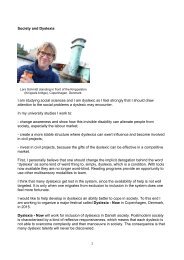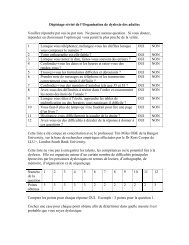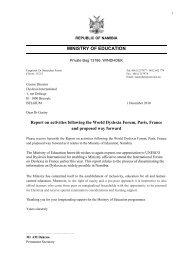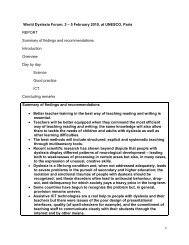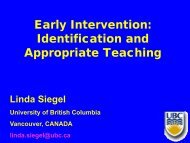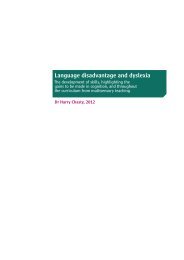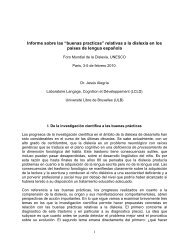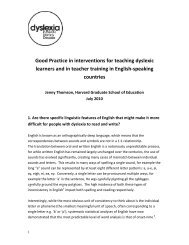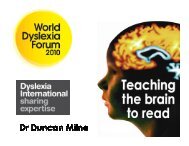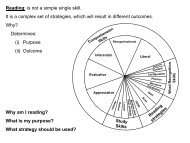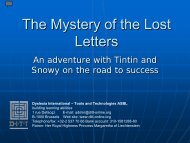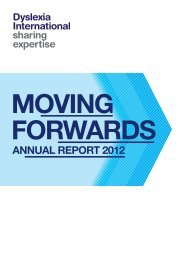Johan Schepens - Dyslexia International
Johan Schepens - Dyslexia International
Johan Schepens - Dyslexia International
You also want an ePaper? Increase the reach of your titles
YUMPU automatically turns print PDFs into web optimized ePapers that Google loves.
<strong>Dyslexia</strong> <strong>International</strong> – Tools and Technologies ASBLbuilding learning abilities1 rue Defacqz Web site: www.ditt-online.orgB-1000 Brussels, Belgium E-mail: admin@ditt-online.orgTel/fax: +32-2 537 70 66 Bank account: 310-158 1288-80Patron: Her Royal Highness Princess Margaretha of LiechtensteinNewsletter No 22 · Winter 2005–6ContentsInstruments of destruction?The dyslexia dilemma 2Profiles 7What works 8– Language Shock – <strong>Dyslexia</strong>across cultures 8– Ultimate Maths Invaders 8– Notetaker 9– User’s Guide to Memory 9– The <strong>Dyslexia</strong> Council 10– Speech recognition software 10– The LEXY treatment 10– Study skills 10– Special needs site 11– The Special Needs ComputingResearch Unit (SNCRU) 11– All kinds of minds 11– The <strong>Dyslexia</strong> Instituteincorporating the Hornsby<strong>International</strong> <strong>Dyslexia</strong>Centre 11Announcements 12Money matters 14Reflections 15– ‘Imagination is more importantthan knowledge’ 15– Can you raed tihs? 15– Fun and games 15Writing answers under pressure in exams, filling informs ... when pens and pencils destroy the dyslexiclearner’s best intentions.Illustration taken from a picture by Paule Zoller.D·I·T·T volunteers work with leading experts, creating and promoting tools that enable dyslexic learners tosucceed in a competitive world
The dyslexia dilemma‘Tom Birch is as brisk as abee in conversation; but nosooner does he take a pen inhis hand, than it becomes atorpedo to him, and benumbsall his faculties.’Dr Samuel Johnson(1709–1784) quoted in Boswell’sLife of Johnson, 1743How many dyslexic students are set to fail their examsyet again because their difficulties with handwriting,spelling and organizing their ideas on the written pageare still not being addressed?Crutches for the lame, glasses for the short- or longsighted– fine! But how many recognised dyslexiclearners do not have the right to use a computer or thebudget to buy one?And even where dyslexia is recognised officially as a‘handicap’, rights to appropriate learning facilities – extrahelp, adapted teaching and technologies – do notautomatically follow.What are the possibilities for seeing that all dyslexicyoung people have basic equal rights across the board?In Europe it could be through just one case brought tothe European Courts by parents, but only those whohave already exhausted their national appeal systems atno small financial cost.Who are the parents who not only have the money andcourage to pursue a case, but who are also prepared toput their own child on the line?Until such a case is ruled upon, with no coherent policyor commitment by ministries and no cohesive response atinternational level, variations in provision for dyslexicstudents will remain; a few do benefit from beingrecognised and granted an assessment, extra time inexams, extra help and – all importantly – the use of acomputer for their written work. But what of the rest?Positive responsesWhere ministries do recognise dyslexia, provideguidelines and insist on the appropriate provision, andwhere such action is not left to the arbitrary decisions ofindividual schools and local lobbyists, the dyslexiclearner is likely to fare better. D·I·T·T was pleased to beinvited recently to make recommendations to the localBelgian French-speaking ministry of education.Moreover, Estonia and other new Member States of theEuropean Union are taking a keen interest in exploringchanges to accommodate dyslexic students, and areready to learn more about the latest scientific research.page 2 D·I·T·T Newsletter · No.22 · Winter 2005–6
A Belgian professional’s experience<strong>Johan</strong> <strong>Schepens</strong>, Co-ordinator of the <strong>Dyslexia</strong> Team atthe Bevegem college in Belgium, says there is a lack ofsupport where secondary schools are concerned. InBelgium statutory provision is in place for dyslexiclearners up to the age of twelve; thereafter there is littleor nothing. <strong>Schepens</strong>, who works with secondary-schoolchildren, has developed a new approach and he shareshis experiences with readers below:‘I’ve been teaching languages for 30 years and I havealways been bothered by the fact that there are ablepupils who fail at languages despite their best efforts. Ihave been involved with dyslexia for many years too,and currently I am the co-ordinator of the team foradapted guidance dealing with all kinds of needs fromdyslexia to terminally ill children.‘I have also gained first-hand experience of dyslexia asmy wife is dyslexic. She comes from Ireland, and wediscovered her condition when she was learning Dutch.A lot of people reacted with utter disbelief: “How couldshe have made a career in an insurance company whilebeing dyslexic?”‘When we started to look for early signs my wiferemembered that, when she was a child, her primaryschool teacher had sent her to an eye-specialist becauseshe copied things incorrectly from the blackboard. Asshe had perfect eyesight, no further action was taken.After that she had a miserable time at school.‘I teach French and English in Flanders, the Dutchspeaking region of Belgium, in a grammar school whichoffers Latin, Greek, modern languages and science. So Ideal with teenagers who either come to us with aproblem (about 40% of the students) or are found tohave one during secondary schooling (60%). These arethe ones I am concerned about.‘The following situation is unfortunately all too commonfor intelligent dyslexic pupils:‘They come into the 7th grade (12-year-olds) as top oftheir class in primary school. They start in the Latinsection and, with a lot of work and problems, make itinto the second year. Then they begin to experiencedifficulties with Latin, English and French, so they turnto putting their efforts into the sciences. They developvery good compensatory skills, but they struggle to cope.These young people and their parents are unable toexplain their “sudden” difficulties in learning, and manypage 3 D·I·T·T Newsletter · No.22 · Winter 2005–6
‘Flash-list’ – a list of warning signsthat a learner may have dyslexia:! spelling problems in themother tongue/foreignlanguage! writes phonetically! writes illegibly: with crossingsout! lack of structure! poor vocabulary! better oral than written skills! weak comprehension (readingand listening)! poor short term memory! fails to understand questions! cannot read time! cannot correct his or her ownmistakes! inverts numbers/miscalculates! cannot remember dates/facts/series/tables! makes personal mnemonics! has orientation problems –knowing right from left! coordination problems! time-keeping difficulties! separating essentials fromside-issues! reads with finger on page orguessesteachers often have difficulty accepting there is aproblem. They prefer to think that the pupil is lazy,unruly, sloppy and uninterested. If we can’t help them atthat very point when the first problems arise, then theymostly end up as drop-outs.‘On the other hand, it’s not that teachers don’t want tohelp, but without proper training they don’t really knowwhat to do. But for myself, as someone who understandsdyslexia and the way it can ruin lives – I do not find itdifficult to recognise and over the years I’ve developed asimple strategy to support dyslexic learners.‘First of all, acknowledge the fact there is a problem.Don’t burden the child with useless remedial teaching.Try to speak to the child – establish a basis of trust. Theyall feel they are different, but don’t know in what way(though if they learn 10 Latin words by heart in theevening, by the morning most are forgotten).‘We then check of the student’s learning ability againstthe “Flash-list”, a list of warning signs. As a general ruleI advise my colleagues that if they have to tick off morethan one third of the indicators, then there is reason forserious concern, and a proper test is advised.‘After dyslexia has been diagnosed we arrange a meetingof the parents, the pupil and the external advisor(a specialised dyslexia advisor). This meeting is importantto establish a basis of trust. The pupil is involved in allsteps of the process from making the support-plan toimplementing it in order to strengthen self-confidenceand self-esteem.‘Together we agree on the way to help. The plan is thensubmitted to the class teachers to be discussed andimplemented, and after exams we assess and adapt thisplan if needed. It is my firm belief that dyslexic pupilscan help each other, so I proposed a self-support groupfor dyslexic pupils. In future I plan to start a meetingpoint for parents. It is vital to involve them in the wholedevelopment process too in order to obtain the bestpossible result.‘It is obvious to all that dyslexia can have a seriousimpact on the child’s keeping up with the schoolcurriculum, but it also has an impact on the personalityand the social behaviour of the child, and on the familydynamics. With proper help, however, and even someapparently minor adaptations, dyslexic children have areal chance of making it through secondary school andeven onto further education.’page 4 D·I·T·T Newsletter · No.22 · Winter 2005–6
Progress in some areasIn the UK the British <strong>Dyslexia</strong> Association and theteaching and assessment <strong>Dyslexia</strong> Institute have made amajor contribution to bringing about statutory changesto ensure that dyslexia is better understood andaddressed. Effective interventions are occurring attertiary education level. Last term, as part of the British<strong>Dyslexia</strong> Association’s <strong>Dyslexia</strong> Awareness Week, aLondon university college organised a variety of advicesessions and group workshops to provide informationabout dyslexia and study tips for dyslexic students.D·I·T·T’s responseD·I·T·T, in co-operation with the D·I·T·T e-trainingconsultancy group, proposed targets for an on-linetraining programme on teaching dyslexic learners to Intelin December. Intel works closely with the ministries andall classroom teachers benefit from the latest in on-linetraining – which in certain instances is pre-requisite.D·I·T·T agrees with Dr Harry Chasty’s statement that ‘atleast 90 percent of dyslexic learners could be taughteffectively in mainstream classes if teachers received theappropriate training.’The D·I·T·T proposal for on-line teacher-trainingregarding dyslexia is on the lines of the structure shownoverleaf.page 5 D·I·T·T Newsletter · No.22 · Winter 2005–6
" An understanding ofwhat dyslexia is –definition" Discovering dyslexia inthe individual student –assessment" Effective teaching –intervention– definitions of dyslexia – more than a century of findings:commonalities with current theories: broader and narrowerdefinitions– aetiology – latest research on the brain– physiological factors affecting dyslexic and non-dyslexic learners:· audio/visual/kinaesthetic – affecting information input· the brain and processing of information– manifesting symptoms of dyslexia– resultant behaviours/psychological effects in dyslexic learners– co-morbidities– personal experiences of dyslexia/testimonies (see Tintin ‘Hall ofFame’ in The Mystery of the Lost Letters cd-rom)The importance of understanding the individual learner’scapabilities/deficits and knowing how to:– make a first level assessment + miscue analysis + effective testsavailable– consider physiological factors audio/visual/muscular– birth factors? – developmental v acquired dyslexia– learning readiness – psychological factors including parentalattitudes– social considerations family circumstances – mobility/insecurity– linguistic demands – number of languages spoken/demanded ofthe learnerFeaturing:– The teacher as a collaborator – restoring confidence/ learningreadiness/unblocking barriers to learning induced by priornegativities– teaching methodologies (video of complete lesson) that wouldinclude essential classic – multisensory – structured –overlearning in teaching r and w– linguistic dictates: sounds/structure/meaning as these affectteaching r and w methodologies for dyslexic learners) – secondor third language considerations– development of memory– systematic development of organizational/study skills + maths– matching the teaching to the learners style – strengths toweaknesses approach– insistence on celebrating abilities and positive outcomes for thelearner– assistive technologies – their virtues/limitations– age appropriate approaches and materials– appropriate teaching environment (see Judy Brooks’ BBC video)– checklist of teaching tips – interactive – video presentationpage 6 D·I·T·T Newsletter · No.22 · Winter 2005–6
ProfilesTwo distinguished guest speakers, Dr Chris Singletonand Dr Duncan Milne, will visit Brussels for the D·I·T·TAnnual Open Forum this Autumn 2006.Dr Chris Singleton is a chartered psychologist, seniorlecturer in educational psychology, and director of thePsychological Assessment Unit at the University of Hull,UK. He lectures in educational psychology, cognition andlearning, and child development. His main research andprofessional interests are in the development of literacyand the identification and education of children andadults with dyslexia or other learning problems. He isinternationally known for his pioneering research thatresulted in the development of computer-based systemsfor the screening and assessment of dyslexia, known asCoPS (Cognitive Profiling System), LASS, Lucid Rapidand LADS. These systems are now used in more than7,000 schools and colleges in the UK and have beentranslated into several languages. For furtherinformation, visit www.lucid-research.com.From 1996–99 Dr Singleton was editor of the Journal ofResearch in Reading and he remains a member of theeditorial board of that international journal. He is aformer member of the British Psychological Society’sCommittee on Test Standards. He has also been a memberof the Computer Committee of the British <strong>Dyslexia</strong>Association for 15 years, and has chaired threeinternational conferences on computers and dyslexia. Hewas chairman of the National Working Party on <strong>Dyslexia</strong>in Higher Education, which investigated the assessmentof, and provision for, dyslexics in higher education.More recently he has become a member of the Britishgovernment’s working group on dyslexia in highereducation.Dr Singleton has been keynote speaker on theassessment, diagnosis and support of dyslexia in childrenand adults at many international conferences, includingevents held in Belgium, Brazil, Cyprus, Denmark, France,Greece, Ireland, Italy, Norway, Sweden, Switzerland andthe USA. He is author of more than a hundred scientificpapers on dyslexia and the development of literacy, aswell as author/editor of several books, includingComputers and <strong>Dyslexia</strong> (1994) and PsychologicalAssessment of Reading (1997).page 7 D·I·T·T Newsletter · No.22 · Winter 2005–6
Dr Duncan Milne is the author of Teaching the Brain toRead, a teacher-friendly version of his PhD in educationand psychology. Dr Milne studied at the University ofAuckland, New Zealand, and the Brain ResearchInstitute, Australia.Much of Dr Milne’s research has involved advancedbrain-imaging techniques including electroencephalography(EEG) and functional magneticresonance imaging (fMRI). Dr Milne has also worked, atthe University of Auckland Reading Centre, withchildren with learning difficulties.He is passionate about dyslexia, both from a research andan intervention perspective, and has written numerousarticles, educational resources and psychologicalassessments relating to reading and learning difficulties.Dr Milne is the managing director of internationalpublisher Smart Kids, a director of the BritishEducational Suppliers Association (BESA), an advisor tothe Education Show (EMAP, England) and a speaker forthe National Association of Special Educational Needs(NASEN).What worksLanguage Shock – <strong>Dyslexia</strong> across culturesThe Guide that formed part of the Language Shock packis already available in five languages as an e-book. Nowthe video is to be made available at www.ditt-online.org –the full version in English and shorter versions in Frenchand German.Ultimate Maths Invaders‘The new, fun space attack maths game that drillsnumber, facts and tables features cool, exciting 3D-stylegraphics and wide-ranging content for ages 5-14+. Thegame caters for all players, from those with special needsto the arcade addict, pushing each player to theirpersonal skill and maths limit. Extensive record keepingallows both parents and teachers to monitor each pupil’sprogress.’ See www.edalive.compage 8 D·I·T·T Newsletter · No.22 · Winter 2005–6
NotetakerFrom Don Johnston at the California State University,Northridge (CSUN), Notetaker gives students a simple,portable way to get printed text into an electronic format.This tool is valuable for dyslexic students becauseelectronic text can easily be adapted to accommodatetheir learning needs and abilities.(www.donjohnston.com)User’s Guide to MemorySally Raymond, from Plymouth, recommends YourMemory: A User’s Guide by Alan Baddedley. ‘It’sfascinating’, she says.Given pupils’ differences there is no single solution in theclassroom, but she suggests that teachers:" Discuss with pupils how they remember things. Dothey have strategies to aid memory? (The findings ofthis discussion should be shared.)" Discuss how pupils might identify important/irrelevantinputs. (Discover which students don’t pick uppointers that teachers think they are using)." After a lesson, discuss how much information isretained/dumped by the memory. Only a small fractionis actually retained. Be aware that children may oftengive you the answers they think you want and thatthere will be less capacity for processing other things.With dyslexic learners the short-term memory (STM)often gets overloaded due to weaknesses in specificprocessing skills, ‘using up’ more STM space. Long-termmemory traces can be weak due to overload, lackof understanding, lack of significance/relevance/purpose,or erroneous traces laid down at an earlier date.‘Triggers’ that prompt retrieval of existing memory tracesmay not be those the teacher expects. For example,language-based memory trace of meaning of the word‘multiplication’ may not be accessed accurately/quicklyleading to a failure to be engaged. The word may alsotrigger anxiety, and the word ‘multiply’ may be confusedwith ‘divide’ These affect subsequent processing activity.Learning involves the memory processes, and anythingwe can do to aid memory and memory processing isimportant. Apart from the factors already mentioned,memory prompts, memory strategies and understandingof how we remember/forget things will help raise ourawareness of this complex and fascinating subject.page 9 D·I·T·T Newsletter · No.22 · Winter 2005–6
The <strong>Dyslexia</strong> Councilhas a new interactive Web site:http://dyslexiacouncil.jot.comthat has the facility for continual update by individualCouncil members.And take a look at the graphic Web-search engine on the<strong>Dyslexia</strong> Links page – see the illustration below.Speech recognition softwareIan Litterick of Iansyst writes:As far as speech recognition is concerned, see DragonDictate and other comparables athttp://www.dyslexic.com/dictcomp.htm.The LEXY treatmentPsychologist Jurgen Tijms presented his PhD thesis atthe University of Amsterdam (Faculty of Psychology) lastyear: a study entitled ‘Psycholinguistic treatment ofdyslexia: an evaluation of the LEXY-treatment’.In this study Jurgen Tijms claims positive effects of thepsycholinguistic LEXY-treatment with adults andchildren with dyslexia. At the end of the treatment thedyslexic students have reached functional levels ofreading and spelling that seem to have lasting effects.Study skillsThe Web site www.studygs.net is not to be missed! It hasbeen recommended by Susan van Alsenoy, D·I·T·Tmember and valued researcher, who keeps all of us onher mailing list abreast of new findings on both sides ofthe Atlantic.Result of a Kartoo search on ‘dyslexia’– the searcher can use either the liston the left-hand side, the sponsoredlinks on the right, or the elements inthe centre map to go furtherhttp://www.kartoo.com/page 10 D·I·T·T Newsletter · No.22 · Winter 2005–6
Special needs sitewww.snapassessment.com/resource.htm by Dr GavinReid of the Mystery of the Lost Letters games – ‘anexcellent site for special needs recourse’, says vanAlsenoy.The Special Needs Computing Research Unit(SNCRU)at the University of Teesside is an active body ofacademics, research staff and postgraduate students thatoffers expertise in the areas of accessibility and webtechnologies – a wide range of knowledge and skillsbased around Web design, e-learning, virtual learningenvironments and mobile technologies.Why not check out and sendus your feedback on itemslisted in ‘What works’?D·I·T·T always welcomesideas and suggestions forimproving the advice itoffers.E-mail your comments to:admin@ditt-online.orgAll kinds of mindsA Web site recommended by Simon Midgley of thesenco-forum (www.simonmidgley.co.uk) Says Midgley:‘Very well worth a look. I use the site to provide me witha source of great strategies either to use with my studentsor to recommend to other staff to use in their subjects. Itis a good for ideas, tips and hints to include on individualeducation programmes.See allkindsofminds.org/learningbase.aspxThe <strong>Dyslexia</strong> Instituteincorporating the Hornsby <strong>International</strong> <strong>Dyslexia</strong>Centreis offering a level 3 Distance-learning course, accreditedby Surrey & Region OCN, from January 2006. It is openaccessand is suitable for teachers and assistants. Forfurther details visit the Web site:www.dyslexia-inst.org.uk.page 11 D·I·T·T Newsletter · No.22 · Winter 2005–6
AnnouncementsThe Mystery of the Lost Letters CD-ROM goes outworldwide" The British Council, Alliance Française and GoetheInstitute are now being offered complimentary copiesfor evaluation at all their offices across the world." Commercial contacts have been established throughBrussels Export in 78 countries." Training on-line – working with ministries:D·I·T·T is hoping to distribute the cd-rom on a widerscale at ministerial level in partnership with Intel.Honorary board members Christopher James Ian, PeterHoremans and Judith Sanson visited Dr Andreas Dott,consumer programs manager EMEA, Intel, inDecember. Dr Dott showed how technology functionsat the heart of education. He demonstrated Intel’s onlinetraining platforms developed with ministries.These are already used in schools throughoutGermany and Austria – just a mustard seed sample ofthe on-line training that is destined for much wideruse.D·I·T·T was invited to submit a proposal for learningobjectives for basic training in teaching dyslexicstudents, a project that would evaluate their latestlearning tool, the cd-rom produced by the BBC forD·I·T·T, and also to give a presentation of the cd-romin Munich this spring.page 12 D·I·T·T Newsletter · No.22 · Winter 2005–6
UNESCOD·I·T·T has been invited to submit a paper to UNESCO asa partner by the assistant director general for educationfor the UN Decade of Literacy. D·I·T·T plans to play a coordinatingrole in putting forward position papers basedon the views of an e-training consultancy group. Themain long-term aim: a conference on dyslexia at UNESCOto bring together education ministries from across theworld to share best practice.German <strong>Dyslexia</strong> Congress in BerlinFor the first time ever at a German <strong>Dyslexia</strong> Congress,educational representatives explained the situation andoutlined the progress that had been made in theirindividual states (Bundesländer) in order to help andsupport dyslexic children.Together with Tintin and Snowy, Gudrun and RolfDziallas represented D·I·T·T at the 15th Congress of theGerman <strong>Dyslexia</strong> Association (BVL) at the HumboldtUniversity in Berlin, 22–25 September 2005. It wasattended by over 1300 delegates and about 120 expertswere invited to speak. There was an exhibition ofrelevant materials, and Gudrun and Rolf organisedpresentations of the cd-rom throughout the day. DasGeheimnis der verlorenen Buchstaben – Tim hilftlegasthenen Schülern attracted many visitors andinquiries.More details about the congress are available on the BVLWeb site: www.bvl-legasthenie.deBETT 2006D·I·T·T was recently invited to run a seminar at BETT,the world’s largest educational ICT (InformationCommunications Technology) (www.bettshow.co.uk)Inter-nationalD·I·T·T warmly thanks its international array of youngpeople who have taken time to help in so many ways:Maria from Russia for her research, Dalto from Brazil foradministration and packing, and Wakana from Japan fororganizing the Winners Team and recommendingsoftware in French that helps with reading, writing,spelling, memory, organisation, maths, language learningand keyboard skills. Cecilia, who is now studying for anMBA, still drops by the office to give invaluable support,page 13 D·I·T·T Newsletter · No.22 · Winter 2005–6
as does Dr Vincent Goetry – in the middle of his manyother commitments. Recently we welcomed Ami ofJapan, whose mother Eiko Todo founded the Japanese<strong>Dyslexia</strong> Association. This February we also welcome ournew part-time stagiaire: Marta, from Poland.Money mattersYour support is needed. Please do not hesitate to sendyour donation or hold your own fund-raising event tohelp us develop our projects and run our modest officesin central Brussels. Details can be found at www.dittonline.orgunder Membership and donations.page 14 D·I·T·T Newsletter · No.22 · Winter 2005–6
Reflections‘Imagination is more important than knowledge’Thus said Einstein – who was, incidentally, dyslexic.Not far from the D·I·T·T offices an exhibition: ‘Einstein,the other view’ is being held to mark the 100thanniversary of the publication of four of his majorscientific papers that turned the world of physics on itshead in 1905. Einstein was a man of charm andcommitment, who had close links to Belgium and theBelgians.www.tempora.be/einstein.htmwww.alberteinstein.be‘Dyslexic learners havemany talents that justdon’t happen to includereading and writing.’Professor John Stein, Chair,D·I·T·T Scientific AdvisoryCommitteeCan you raed tihs?Msot popele can. I cdnuolt blveiee taht I cluod aculaltyuesdnatnrd waht I was radnieg. The phaonmneal pweorof the hmuan mnid, aoccdrnig to a rscheearch atCmabrigde Uinervtisy, it dseno’t mtaetr in waht oerdr theltteres in a wrod are, the olny iproamtnt tihng is taht thefrsit and lsat ltteer be in the rghit pclae. The rset can be ataotl mses and you can sitll raed it whotuit a pboerlm.Tihs is bcuseae the huamn mnid deos not raed erveylteter by istlef, but the wrod as a wlohe. Azanmig huh?yaeh and I awlyas tghuhot slpeling was ipmorantt!So where does this put phonics – with all the regionalvariations too?For information on synthetic phonics seewww.syntheticphonics.com.Fun and gamesCan you get those Member States located?Try this interactive quiz:www.ditt-online.org/Archives/EU-MS-quiz.ppt– but be warned – it’s not easy!Map on page 12 designed by Alic MerlivatNewsletter edited by Jon Eldridge, designed by Pauline Key-Kaïrispage 15 D·I·T·T Newsletter · No.22 · Winter 2005–6



